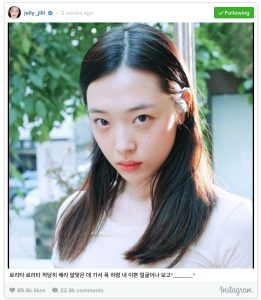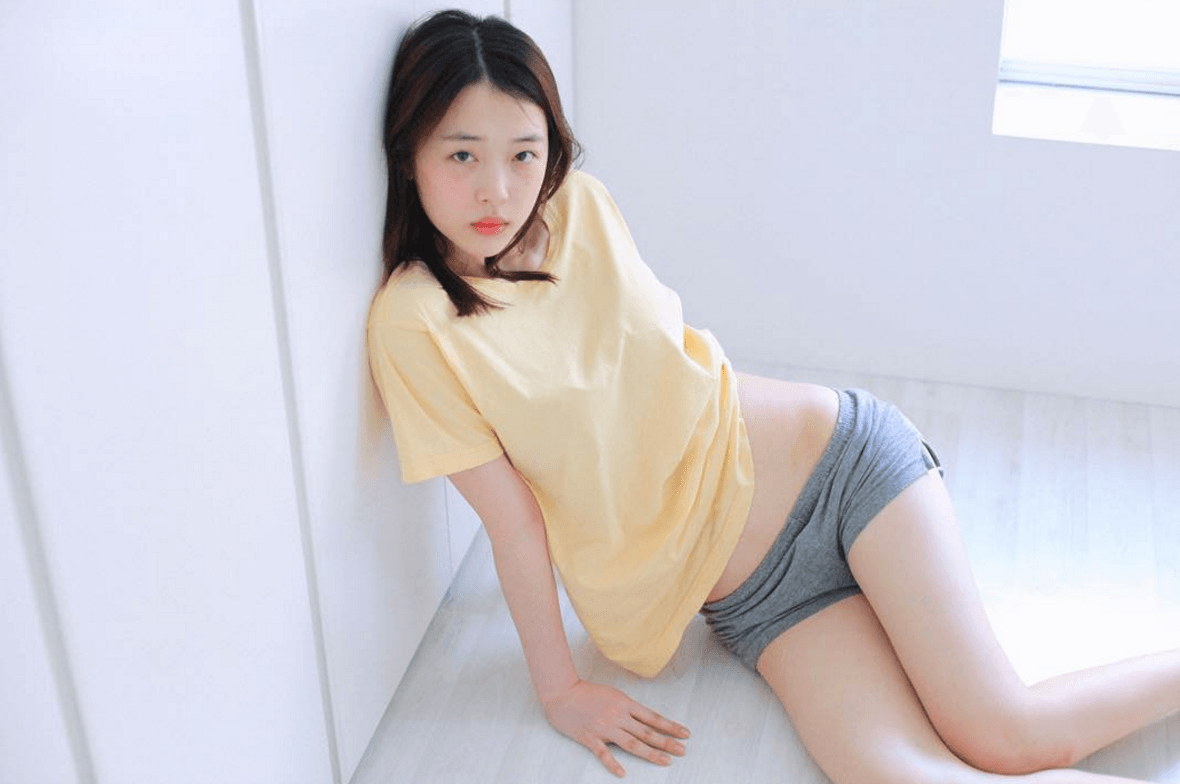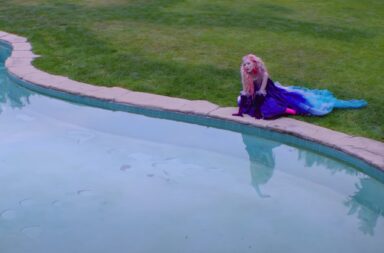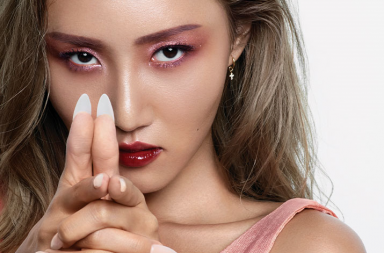 Following a breakup, Sulli has recently deleted all of her Instagram photos, the same Instagram photos which have been a topic of debate for quite some time among domestic and international fans alike. Not adhering to general standards of Korean celebrities, Sulli has been very indiscrete about what she posts on her Instagram, often lacking the restraint and filter that one would normally expect from a public figure and former idol.
Following a breakup, Sulli has recently deleted all of her Instagram photos, the same Instagram photos which have been a topic of debate for quite some time among domestic and international fans alike. Not adhering to general standards of Korean celebrities, Sulli has been very indiscrete about what she posts on her Instagram, often lacking the restraint and filter that one would normally expect from a public figure and former idol.
Not surprisingly, the images that have garnered the most attention are the ones displaying her sexual freedom. But whether she is posting images of phallic culinary art, her in a revealing bikini, or her not wearing a bra under her shirt (for a complete rundown, see this post), none of these photos have drawn as much attention and debate as those shot by that of the infamous photographer Rotta, whose signature lolita-inspired photoshoots have too become a subject of controversy.
Eventually, all good things must come to an end. With all of Sulli’s past Instagram photos gone for the foreseeable future, let’s explore the different attitudes people have had towards the cult that is Sulli’s Instagram.
 The debate over Sulli’s behavior basically boils down to two camps. In one camp are those who feel that, as a public figure, what she’s doing is inappropriate. Korean celebrities are held to a standard of behaving as proper role models for society and Sulli has somehow breached this social contract through her public displays of sexuality. Through this point of view, her work with Rotta represents an internalized oppression which rationalizes why she, of her own free will, posts photos of herself that sexually objectify and subject her to the overt sexism of the male gaze.
The debate over Sulli’s behavior basically boils down to two camps. In one camp are those who feel that, as a public figure, what she’s doing is inappropriate. Korean celebrities are held to a standard of behaving as proper role models for society and Sulli has somehow breached this social contract through her public displays of sexuality. Through this point of view, her work with Rotta represents an internalized oppression which rationalizes why she, of her own free will, posts photos of herself that sexually objectify and subject her to the overt sexism of the male gaze.
On the other hand, there are those who view Sulli’s actions as not only permissible, but also wonderfully brave. Having had her sexual image controlled and commercialized by her company from a very young age, Sulli is reclaiming her sexual agency as an act of institutional rebellion. Furthermore, her general carefree attitude towards her critics have made her a champion of sexual liberation. From this perspective, her work with Rotta is empowering because it’s a symbolic act of her taking back control of her sexual image.
 In essence, this debate is inherently one on feminism. Whether one is more inclined to support or denounce Sulli’s actions has largely to do with one’s personal views on feminism. That is, the division between the two camps represents the internal struggle that many modern feminists face. The divide in opinion among third-wave feminism pose direct challenges to how people view the topic of female sexuality, and nowhere is that more evident than in the debate that’s been constructed around Sulli and her Instagram.
In essence, this debate is inherently one on feminism. Whether one is more inclined to support or denounce Sulli’s actions has largely to do with one’s personal views on feminism. That is, the division between the two camps represents the internal struggle that many modern feminists face. The divide in opinion among third-wave feminism pose direct challenges to how people view the topic of female sexuality, and nowhere is that more evident than in the debate that’s been constructed around Sulli and her Instagram.
Third-wave feminism saw the feminist movement segment itself into many different sub-groups focusing on individualized experiences as opposed to a broader collectivist one. Among this splintered fray of specialized feminist sub-groups arose two opposing schools of thought. Anti-pornography feminism, as the name suggests, opposes the porn industry and views its mainstream commercialization as a harmful influence on society. In response, sex-positive feminism is a proponent of sexual freedom and supports the right of individual women to be in complete control of their sexuality and to make sexual decisions without regard to societal pressures. These opposing schools of thought outline the contextual framework in which the Sulli debate permeates.
The anti-pornography feminists would diagnose Sulli as having a classic case of internalized oppression. Because of her background as an idol, having been a trainee since she was 10-years old and subsequently debuting in the industry at the tender age of 15, it can be argued that much of Sulli’s upbringing revolved around the world of mainstream media. As a member of girl group f(x), her sexuality has been commercialized ever since she was a teenager. Given that K-pop has no problem sexualizing its female stars from an early age, the Lolita Effect not only thrives in the tastes of its consumers, but it also has an effect on the mindset of its performers.
 Having been a victim of the Lolita Effect, Sulli has associated her sexualized image with one that’s brought her fame and adoration from her many fans. In other words, she has internalized the commercial sexualization of herself by viewing it as a positive. It is no wonder then that she would be drawn to the lolita-style imagery espoused by Rotta. In doing so, she is outwardly demonstrating the internalized oppression that’s been instilled in her from a very young age. Having been taught most of her life that this is what’s good for her, she’s chosen to reinforce the forced sexualization of her image, though in a more explicit fashion, by reproducing a similarly sexualized image in her work with Rotta.
Having been a victim of the Lolita Effect, Sulli has associated her sexualized image with one that’s brought her fame and adoration from her many fans. In other words, she has internalized the commercial sexualization of herself by viewing it as a positive. It is no wonder then that she would be drawn to the lolita-style imagery espoused by Rotta. In doing so, she is outwardly demonstrating the internalized oppression that’s been instilled in her from a very young age. Having been taught most of her life that this is what’s good for her, she’s chosen to reinforce the forced sexualization of her image, though in a more explicit fashion, by reproducing a similarly sexualized image in her work with Rotta.
Through the lens of anti-pornography feminists, the Lolita Effect can be viewed as a result of the harmful effects of commercializing pornography in the mainstream. By permitting mass media to emulate the fetishes of porn categorized as “teen” or “barely legal,” it’s created an atmosphere in which lolita imagery runs rampant. As mentioned, girl group imagery is heavily influenced by lolita-esque themes and these barely legal teens are generally marketed towards their most lucrative demographic, men in their 30s-40s. By extension, albeit using victim-blaming logic, lolita imagery may even encourage pedophilia. Thereby, Sulli is not doing anyone any favors when she shares her sexuality in such a way with the public. She should use more discretion in order to be a better role model and public figure.
 On the flip side, we have sex-positive feminists who celebrate Sulli for her sexual liberation from her oppressors. Sulli is a champion of sexual freedom in many ways. First of all, she is exercising her right to express her sexuality how she chooses. She’s not hindered by social and cultural expectations of being a celebrity, a public figure, and most of all, a woman. In fact, she defies many of those expectations and chooses to express herself freely in the face of adversity in the form of constant online harassment, further tainting of her public image, and potential setbacks to her career and financial prospects. In this light, Sulli can be viewed as a martyr of sex-positive feminism in her prioritization of her sexual freedom over her career.
On the flip side, we have sex-positive feminists who celebrate Sulli for her sexual liberation from her oppressors. Sulli is a champion of sexual freedom in many ways. First of all, she is exercising her right to express her sexuality how she chooses. She’s not hindered by social and cultural expectations of being a celebrity, a public figure, and most of all, a woman. In fact, she defies many of those expectations and chooses to express herself freely in the face of adversity in the form of constant online harassment, further tainting of her public image, and potential setbacks to her career and financial prospects. In this light, Sulli can be viewed as a martyr of sex-positive feminism in her prioritization of her sexual freedom over her career.
Secondly, Sulli is reclaiming her sexual agency by taking back control of her image, an act that is in direct defiance of SM Entertainment, a company which had completely dictated and crafted every aspect of her public image, and which she is still under contract with. In doing so, Sulli has brought discomfort to those who are unfamiliar with this side of her. The difference in the tone and aesthetics between her commercially-crafted image and her self-crafted one reveals the hypocrisy behind K-pop’s lolita complex — that it’s perfectly fine to package lolita imagery as a commercial product but when it’s presented as a person’s authentic portrayal of her sexuality, it no longer upholds the facade of innocence and it’s viewed as dirty, immoral even. By doing what she is doing, Sulli is exposing the thinly-veiled line between what is considered acceptable and what is morally compromising.
 Lastly, Sulli’s supporters are likely to mention that she’s not afraid to speak out against those who do not agree with what she is doing. In response to spiteful comments concerning her work with Rotta, she posted a vengeful image of herself with the retort, “LOLITA, LOLITA, THAT’S ENOUGH. GO AND SWEAR WHERE IT’S MORE APPROPRIATE. JUST LOOK AT MY PRETTY FACE^____^”
Lastly, Sulli’s supporters are likely to mention that she’s not afraid to speak out against those who do not agree with what she is doing. In response to spiteful comments concerning her work with Rotta, she posted a vengeful image of herself with the retort, “LOLITA, LOLITA, THAT’S ENOUGH. GO AND SWEAR WHERE IT’S MORE APPROPRIATE. JUST LOOK AT MY PRETTY FACE^____^”
While not the most articulate of statements, her sentiment is in line with the rhetoric of sex-positive feminism. Through her vindictive statement, it can be inferred that Sulli refuses to back down from the societal pressures applied on her via the endless barrage of negative comments she’s received. She also asserts her sense of agency by implying that she is unfazed by her detractors and will continue expressing her sexuality the way she wishes.
Sulli isn’t the only celebrity to receive hateful comments due to her work with Rotta. More recently, model Lee Hee-eun was met with a similar onslaught of netizen uproar for uploading her work with Rotta on her Instagram, and her response was fully in line with the doctrine of sex-positive feminism.
I do individual shoots (with Rotta or anyone else) because I. Want. To. I wanted to work with a photographer who could portray his emotions, as well as save the moments of my prime.
…
Stop with the bullshit on how these photos make women victims, or how these photos turn men into sex offenders. These are words that make me laugh out of shock and give me a headache so I’m looking for aspirin. Isn’t it the sex offender’s fault if they’re a sex offender, and not mine? Who the hell’s arguing with such an outdated logic, claiming mini-skirts encourage rape? -.- Do guys look at my photo and think ‘oh yeah I’m going to go out to rape and molest women’? And if that does happen, is my photo at fault? It’s that man’s messed up head that’s at fault.
…
From now on, I’m going to do whatever I want so if you don’t like it don’t come here, don’t look at it, don’t buy it, piss off. I’m going to post 10,000 shots with Rotta so keep commenting.”
 In addition to calling out the fallacy of victim-blaming and placing blame squarely on the attacker, Hee-eun affirms her right of choice, which includes her right to work with Rotta. She also reasserts her right to express herself however she pleases without having to regard societal pressures. This falls in line with the foundation of sex-positive feminism, which necessitates that women are allowed to be sexual on their own terms. Whether Sulli or Lee-eun decide to share their Rotta photos with the public is completely up to them. As sexually liberated women, they demand to be free from our judgments and criticisms.
In addition to calling out the fallacy of victim-blaming and placing blame squarely on the attacker, Hee-eun affirms her right of choice, which includes her right to work with Rotta. She also reasserts her right to express herself however she pleases without having to regard societal pressures. This falls in line with the foundation of sex-positive feminism, which necessitates that women are allowed to be sexual on their own terms. Whether Sulli or Lee-eun decide to share their Rotta photos with the public is completely up to them. As sexually liberated women, they demand to be free from our judgments and criticisms.
So is Sulli a sexual liberator or is she a manifestation of her internal oppression? She is likely both and she is also neither, depending on one’s viewpoint. Those leaning toward the side of anti-pornography feminism would argue that she’s been a victim of the entertainment industry for far too long and, through her work with Rotta, she’s attempting to replicate the images she’s been ingrained to view as positive despite the image’s inclination (and by extension, the photographer’s inclination) to sexualize her as an infant. On the other hand, those more in agreement with sex-positive feminism would argue that her work with Rotta is empowering in its defiance of the institutional powers which had previously dictated her image and in its uncovering of the ironic contrast between commercialized sexualization and authentic sexualization.
 Keep in mind that these two arguments do not represent a dichotomy but rather a spectrum of beliefs. In fact, I believe that many people are on the fence about the issue, inhabiting a philosophical gray area which cannot be explained by either side of the coin. These are the people who neither view Sulli as a feminist icon nor as a victim of internalized oppression. Instead, they view her in simpler terms — as a 23-year old who’s just living her life.
Keep in mind that these two arguments do not represent a dichotomy but rather a spectrum of beliefs. In fact, I believe that many people are on the fence about the issue, inhabiting a philosophical gray area which cannot be explained by either side of the coin. These are the people who neither view Sulli as a feminist icon nor as a victim of internalized oppression. Instead, they view her in simpler terms — as a 23-year old who’s just living her life.
I highly doubt Sulli set out to be such a point of feminist contention when she decided to throw caution to the wind and go full rogue on her Instagram, but she’s surely been one of K-pop’s most intriguing social media personalities as a result. While her old Instagram photos may be deleted, her account still exists and she’s been active on it since. May Sulli’s Instagram live long and prosper for the benefit and glory of all man and womankind.
Readers, are you supportive or critical of Sulli? Which sub-group(s) of third-wave feminism do you subscribe to?
(Everyday Feminism, Ms. Magazine, Gender & Development, The Grand Narrative, Korea Expose, Underskored, Instagram[1][2], SM Entertainment)



